
danapointtimes.comDana Point Times October 14-20, 2022 Page 11
n informed democracy—that’s what we as reporters and editors strive to shape ahead of every single election.
It’s our job to make sure you as readers and prospective voters know who it is you’re elect ing, what they stand for and how they plan to wield the power you’ve entrusted in them once in office.
With that in mind, every couple of years, we put together our Voters Guide, where readers can hopefully get a better idea of the candidates before you’ve marked your ballots and cast your votes by Nov. 8.

This year’s elections include numerous races that will be decided locally, including the state’s 49th Congressional, 36th and 38th State Senate, 74th State Assembly and the county’s Fifth Supervisorial districts.
Over the past few weeks, we talked to the candidates seeking your vote, asking them about their priorities and goals for office.
In this guide, you’ll also see that we’ve compiled the list of propositions and ballot initiatives, diving into the nuances of what voters are being asked to decide, as well as presenting the various arguments for and against.
To our readers, we thank you for trusting us and the in formation we’ve gathered, and hope this guide serves you well as you begin to fill out your ballots.
49th District Candidates Look to Address Public Safety, Nuclear Storage
BY C. JAYDEN SMITH
This November, incumbent Rep. Mike Levin, who is look ing to secure a third term representing California’s 49th District in the House of Representatives, will face a familiar Election Day foe in Brian Maryott.
Maryott, who earned 46.9% of the votes in the 2020 election for the district, sees his chance in 2022 as an opportuni ty to properly represent the communi ties of the 49th—something he doesn’t believe Levin has done.
“I don’t think he’s the right fit,” Maryo tt said. “I think he’s proven that with his voting record and his policy initiatives, and I think we need stronger and more effective representation.”
Maryott, a career businessman and former San Juan Capistrano coun cilmember, said he has experience in
government that has prepared him to be a voice for more accountability and higher government performance in Congress.
Levin, a San Juan Capistrano resident, was raised in South Orange County be fore attending Stanford University and the Duke University School of Law, his campaign boasts. He also worked as an attorney and the executive director of the Democratic Party of Orange County before his election to the House.
In a phone interview last month, Levin addressed the current political climate regarding abortion and preg nancy loss following the U.S. Supreme Court’s reversal of Roe v. Wade. He said the decision was “deeply disconcerting” and “appalling” to throw out decades of precedent, reasserting his support of a woman’s right to make personal health care decisions.
“In some states, we’re already seeing the horrifying consequences of criminal izing women’s reproductive health deci sions,” said Levin, referring to incidents such as an Indiana attorney general threatening to revoke the license of a doctor who provided a 10-year-old rape victim an abortion.
He added that Republicans would enact a nationwide ban on abortions sponsored by Lindsey Graham if given the chance—although some reports indicate a party split on the legislation.
Maryott said he felt abortion services will inevitably remain safe and legal in most states, and that he did not believe meaningful changes would occur to Cali fornia’s current abortion legislation.
Regarding public schools, Levin mentioned that his children attend local public schools and expressed his gratitude for teachers and other staffs’
efforts throughout the pandemic. He added that he would continue to fight to fund public schools so they could attract high-quality teachers and reduce overcrowding.
Levin added that it was the nation’s constitutional duty to strive to become a more perfect union by learning from his tory, and said the current history being taught in schools adequately reflected that goal.
“I don’t think it’s right to divert all of our taxpayer dollars away from public schools and towards private schools, because they often leave certain kids behind,” he said.
Maryott said he favored school choice over an “archaic” system of using zip codes to determine where children go to government-run schools, and he added that he thought a school choice model was inevitable in California.
danapointtimes.comDana Point Times October 14-20, 2022 Page 12 2022 DANA POINT ELECTION GUIDE
Welcome to the ‘DP Times’ Election Guide A VOTE IN THE GENERAL ELECTION NOVEMBER 8, 2022
CONGRESS
“Parents want choice, they want influence, they want transparency, to see what’s happening with their children’s education,” he said. “I think the public school system, in particular, in many areas has kind of overstepped a little bit into areas that are more parenting than teaching.”
Levin cited his efforts in Congress to address the “scourge of fentanyl” coming into the U.S., including votes for legisla tion that would help law enforcement at the southern border near San Diego and sanction fentanyl traffickers and manu facturers.
He also said the country should ex pand treatment and treat addiction as a disease, rather than a moral failing.
According to Maryott, federal agencies, foreign policy, and enforcement of law and order should reflect a heavy-handed response to the “constant flow of fentanyl over our borders.”
“We’re losing (young people) in record numbers, and it’s tragic,” Maryott said. “We have got to be willing to incarcerate people for long periods of time, if not life, for being any part of the distribution network of fentanyl.”
On public safety and policing, Levin talked about the Invest to Protect Act that he cosponsored along with 85 oth ers, which would provide grants to small er police departments. The bill was one of four that passed in the House on Sept. 22, as part of a major package that would
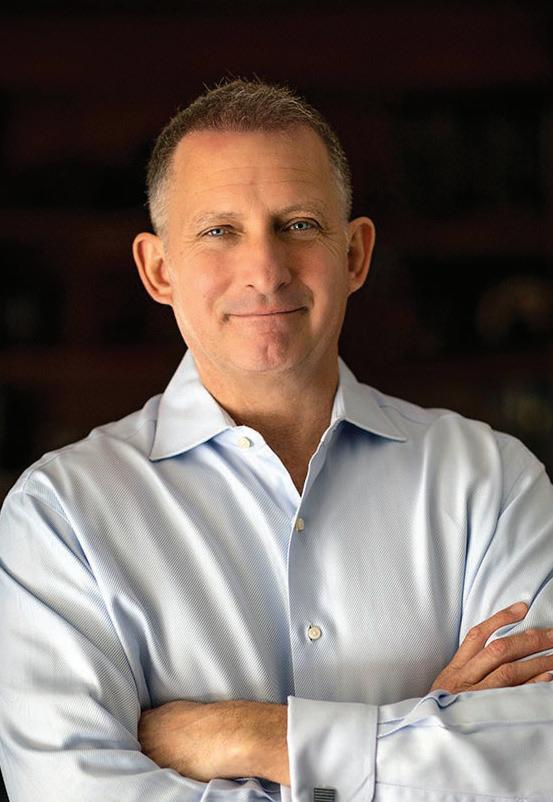
MIKE LEVIN BRIAN MARYOTT
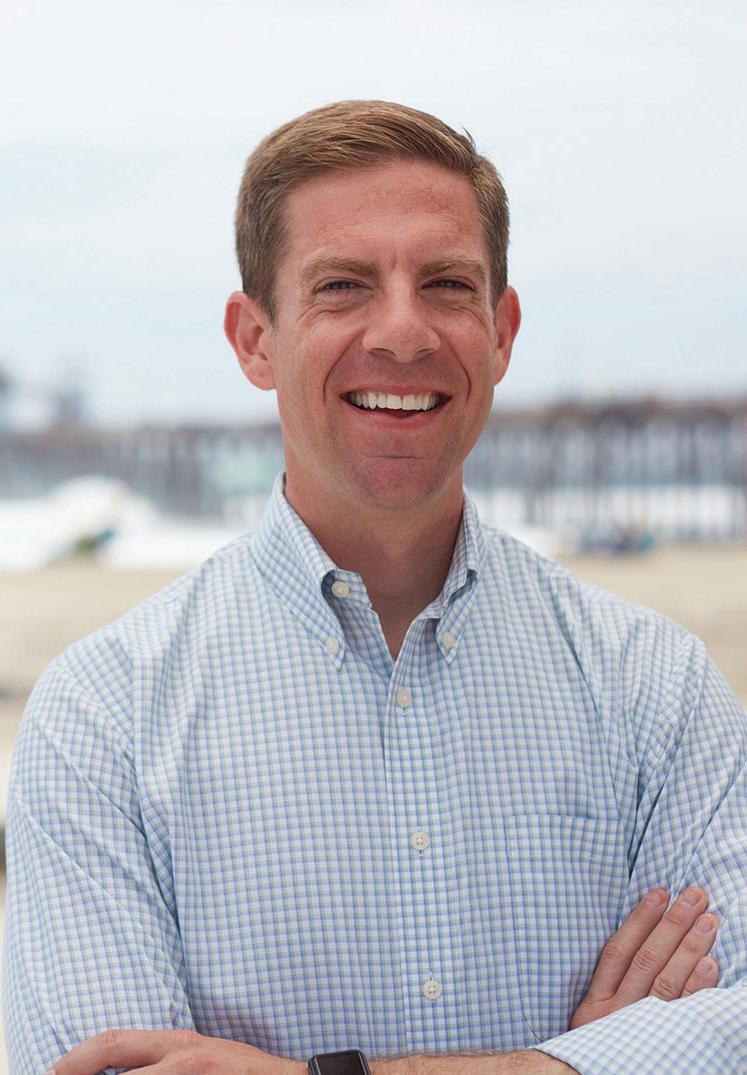
also provide grants to mental health professionals, fund nonprofit organiza tions that work to reduce crime, and give grants to police to solve gun crimes.
Levin said he hoped the Senate would also pass the package and pointed to
other efforts to acquire funding for the Orange County Sheriff’s Department and Oceanside police.
“I’m extremely proud of working with our local law enforcement to do what ever I can,” Levin said of the legislation,
which is currently waiting for Senate consideration.
Maryott, during his interview, was not able to address policing due to time constraints.
While both candidates agree that the spent nuclear waste needs to be removed from San Onofre Nuclear Gen erating Station, both had differing takes on how to accomplish that goal.
Levin said his efforts to listen to the feelings of communities that may temporarily host the waste before the federal government finds a permanent repository follows a model that has worked in Finland and Canada.
He also pointed to funding he had helped secure for the Department of Energy to restart a consent-based siting process, and noted his collaboration with other Democrats to try to establish a new nuclear waste administration to seek a repository through changing presidential administrations.
Maryott said that consent-based siting—which gains input from commu nities that will potentially host facilities to store spent nuclear waste—was a foolish concept, and that the federal government had originally and correctly concluded that Yucca Mountain in Ne vada was the only answer for long-term nuclear storage.
Visit Levin’s and Maryott’s campaign websites for more of their perspectives on national and local issues.

danapointtimes.comDana Point Times October 14-20, 2022 Page 13
Candidates Vie for State Office in 36th, 38th Senate Districts
BY COLLIN BREAUX
Come November, residents in South Orange County will vote on their local voices in the State Senate.
In the 36th District race, which represents those living in Dana Point and San Clem ente, Democrat Kim Carr and Republican Janet Nguyen are running for office. Voters in the 38th District, covering San Juan Capistrano and Rancho Mission Viejo, will decide between Democrat Catherine Blakespear and Republican Matt Gunderson.
Carr said she is a third-generation Southern Califor nian who has lived in the district nearly her entire life. She grew up in Garden Grove, got her bachelor’s degree from California State University, Fullerton and worked as a national sales manager for broadcast television stations.
“I’ve been active in local government for over a decade and have proudly served on Huntington Beach City Council since 2018,” Carr said. “I served as mayor in 2021, and during that time, I led efforts to respond to the 2021 oil spill off the coast of Huntington Beach, strengthened public safety while reducing homelessness by 35% and helped workers and businesses stay afloat during the COVID-19 pandemic.”
If elected to the Senate, Carr said she will fight inflation by fixing supply chains and cutting red tape for local businesses, reduce homelessness by increasing mental health and housing support, and defend repro ductive freedom and the right of all people to control their bodies.
She is also campaigning to combat climate change and protect our beaches and coastal economy, while improving public education and lowering the financial barriers to college for students.
Nguyen, a state assemblymember, did not respond to requests for comment.
In campaign materials, she said she helped pass legis lation expanding health care for the homeless, mentally ill and for lower-income families.
She also said she earned an “A” rating from the How ard Jarvis Taxpayers Association because of her work to protect Proposition 13 and stop tax increases, and she wrote bipartisan legislation to increase a renters’ tax credit to help families deal with the high cost of living.
Nguyen has previously been a state senator and was also an Orange County board supervisor and Garden Grove councilmember.
“She is the first Vietnamese American elected to the State Senate, was the first woman Supervisor to represent the First District, the first Asian American and
KIM CARR JANET NGUYEN CATHERINE BLAKESPEAR MATT GUNDERSON
the first Vietnamese American to serve on the Board of Supervisors, as well as the youngest Supervisor elected in Orange County history,” her website biography states.

“In addition, Sen. Nguyen was the highest-ranking Vietnamese American elected official in California and the highest-ranking Vietnamese American woman elect ed official in the United States.”
In response to a question about affordable housing, Carr said she championed efforts for Huntington Beach to participate in a statewide program allowing the city to purchase existing apartment buildings with zero-in terest loans when she was mayor.
“These apartment units were then eligible to offer reduced rental rates for residents earning anywhere between 80-120% of the (Area Median Income). This pro gram added 674 units of housing to help the needs of middle-income earners without having to build a single unit,” Carr said.
Carr said that she’s also been an advocate for Project Home Key, the state and county partnership that con verted motels into permanent supportive housing units to help the homeless.
“I also believe a reevaluation of CEQA is needed so residents and developers have confidence in the process, and we are able to have sensible, sustainable growth without unnecessary and costly delays,” Carr continued.
CEQA, the California Environmental Quality Act, is a state requirement that municipalities often go through when considering new housing and developments.
As for candidates in the 38th District, Blakespear said her experience as a mayor of Encinitas, a small business owner and a mom makes her the “most qualified candi date to be the leader of our coastal district needs.”
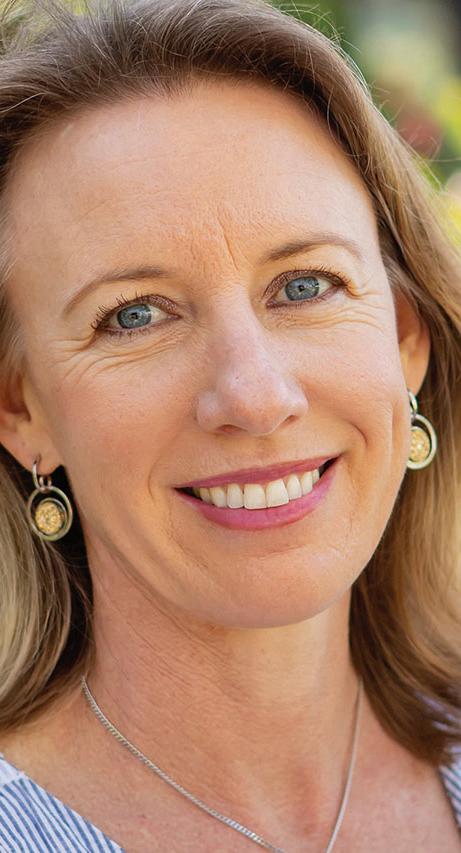
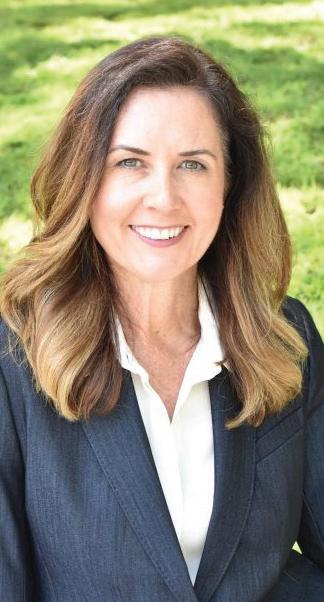
“As your state senator, I will firmly support the repro ductive rights of every woman in California, protect our communities from gun violence, champion small busi nesses, protect our natural resources and ensure a clean, reliable water supply for our state,” Blakespear said.
“During my three terms as mayor, I cut red tape and secured emergency grants to keep small businesses open during the pandemic, banned ghost guns and passed safe firearm storage requirements, provided 100% renewable energy to residents and businesses at no increased cost and improved transportation options, with a particular focus on biking and walking infra
structure.”
Gunderson, who started and then sold auto dealer ships in Orange County, did not respond to requests for comment.
On his campaign website, Gunderson said one of the reasons he is running is because of Californians facing issues with affordability and the cost of living.
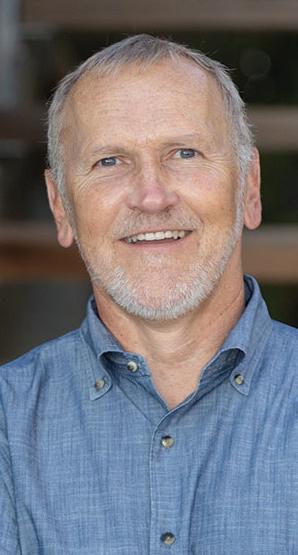
“The state is quickly becoming a place for only the über-rich and the poor. We need to return economic opportunity for a golden California back to the middle class and stop the wave of our best people leaving the state for cheaper alternatives,” Gunderson said.
“The state has a $97 billion-dollar surplus, yet (refus es) to budge on our highest-in-the-nation gasoline taxes,” he continued. “We have the highest income tax and the highest sales tax. The state and SANDAG are exploring a double tax on vehicle usage, in addition to our gas taxes.”
Gunderson also wants to address homelessness.
“The state’s one-size-fits-all, just throw money blindly at a problem (approach) has netted zero results. We must tailor solutions that address individual level caus es of homelessness and supports the local organizations that are reflective of the individual needs of each of our unique communities,” Gunderson said.
“My solutions focus on accountability, compassion, and above all, transparency,” he continued. “There is nothing compassionate about allowing our most vul nerable Californians to sleep on the streets, and it is a fundamental failure of our state that we have allowed this to become such commonplace.”
Blakespear addressed affordable housing when asked about the topic.
“A lot of politicians talk about providing more hous ing options—but I’ve actually done it as mayor. Less than one year after getting state approval for the city’s housing plan, the City of Encinitas has approved more than half of our total assigned goal for the next eight years,” Blakespear said.
“It’s worth noting that our Housing Element Update has resulted in 334 new affordable housing units that are already built or currently underway in Encinitas,” she added. “Our city has also led the way by cracking down on illegal vacation rentals, which are a consistent problem in South Orange County.”
danapointtimes.comDana Point Times October 14-20, 2022 Page 14 2022 DANA POINT ELECTION GUIDE
STATE SENATE
BOARD OF SUPERVISORS
Bates, Foley Discuss Coastal Erosion, Toll Roads, Dana Point Harbor
BY BREEANA GREENBERG
Democratic incumbent Ka trina Foley and Republican challenger Patricia Bates are facing off in the race for Fifth Supervisorial District of the Orange County Board of Supervisors this November.
The Fifth District represents the South County cities of San Clemente, San Juan Capistrano and Dana Point, as well as Laguna Niguel, Laguna Beach, Laguna Hills, Laguna Woods, Newport Beach, and Costa Mesa, with parts of Lake For est and Irvine.
Foley, who has served as the repre sentative for the Second Supervisorial District since March 2021, is seeking reelection to now represent District 5 af ter last year’s redistricting put her home city of Costa Mesa in the newly redrawn District 5.
Foley previously served as a mayor and councilmember of Costa Mesa and was also a trustee on the Newport Mesa School District’s governing board.
Reflecting on her first term as super visor, Foley said she is most proud of the audit she conducted on the county’s funding of homelessness and mental health treatment services, as well as the county’s response to the roughly 126,000 gallons of crude oil that leaked near Huntington Beach a year ago this month.
If reelected, four main issues that Foley would like to focus on are the harbor redevelopments; coastal erosion at Cap istrano Beach; moving the spent nuclear
waste out of the San Onofre Nuclear Gen erating Station and completely closing down of the plant; and supporting the Orange County Sherriff’s Department in keeping the community safe.
As the first mayor of Laguna Niguel, Bates helped to incorporate the city in 1989 and served four terms as mayor. Following her time on the City Council, Bates was elected to the State Assembly, representing the 73rd District.
Bates, who currently serves as a state senator for California’s 36th District, pre viously held the position of Fifth District supervisor from 2007 to 2014.
Following her term on the OC Board, Bates was elected to the State Senate in 2014. During her tenure as a senator, Bates is proud to have authored mea sures that crack down on sex offenders, distributors of fentanyl, and protecting those seeking addiction treatment.
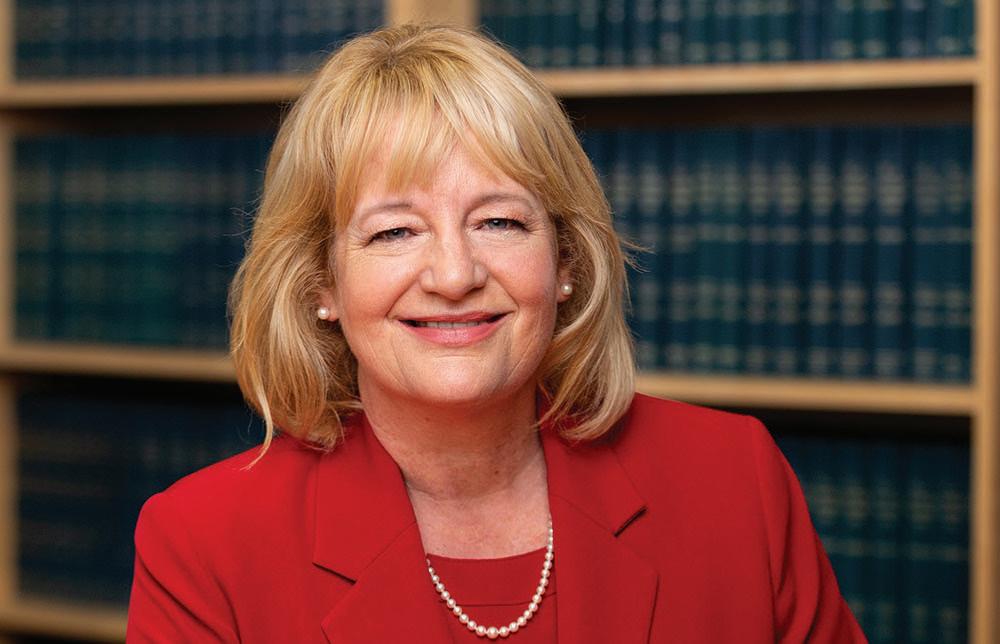
If elected to represent the Fifth Dis trict once again, Bates has stated that she’d prioritize increasing public safety, protecting the county’s coastlines and protecting taxpayers from waste and fraud in government.
In addressing coastal erosion, Bates has previously stated that “bluff safety is crucial to save lives and preserve beach access, which is an integral part of the Fifth District’s economy and way of life.”
Bates noted that the county should apply for Senate Bill 1 funds, which are meant to financially support California’s coastal communities that are addressing sea-level rise. Such funds, she said, would
support sand replenishment efforts “to save beaches and protect vulnerable in frastructure such as our coastal rail lines and roadways.”
As residents, business owners and voters alike have voiced concerns with lack of transparency with the Dana Point Harbor Revitalization project, Foley says she’s spoken with the Harbor Partners to address the issue.
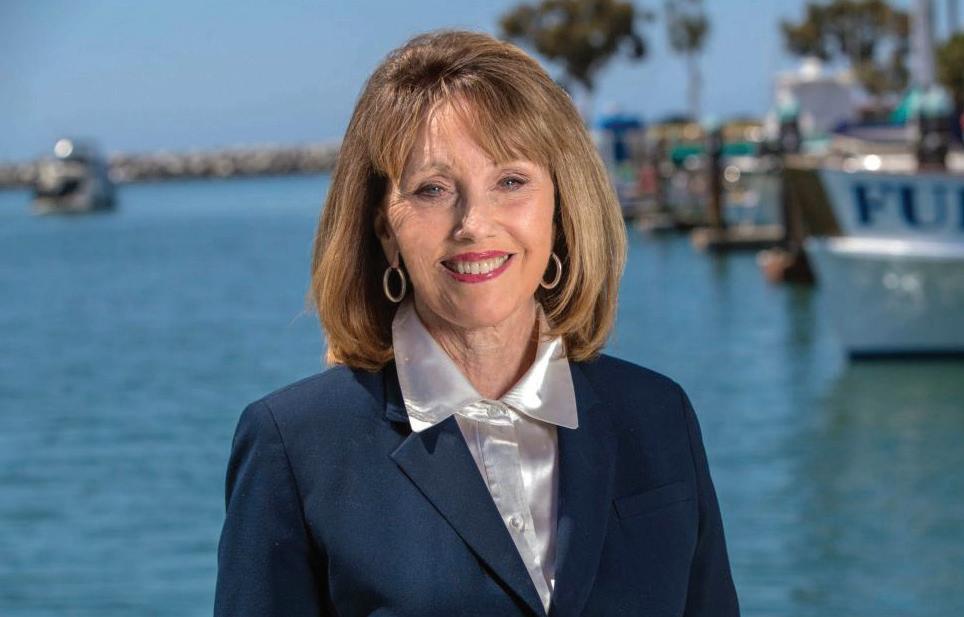
“I think that they do need to do a better job of communicating progress to the public,” Foley says. “I’m an open book when it comes to these kinds of projects; I like to communicate more, rather than less, so you’ll probably see a lot of communication coming out of my office related to status updates related to where the funding is coming from, the timeline for improvement.”
Residents have also voiced concern that the 241 Toll Road could still get extended despite the County Board, Orange County Transportation Author ity and City of San Clemente entering into a cooperative agreement aimed at preventing such an occurrence.
In response, Foley noted that she is against a toll road expansion into neigh borhoods.
“I have a record of protecting business es and homes from eminent domain, and will fiercely defend the right of South County residents to self-deter mination,” Foley said. “I will continue to support the community cooperative agreement for road improvements, and reasonable measures to reduce traffic
such as traffic light synchronization that is based on historic, as well as real-time traffic patterns.”
Bates has previously pushed for legis lation to codify into law that the 241 end at Oso Parkway, which is where it pres ently stops and Los Patrones Parkway begins, essentially blocking an extension through San Clemente.
Per the cooperative agreement, Bates was asked by the City of San Clemente to withdraw the legislation. The agreement, which Bates supported, solidifies three ongoing traffic relief projects in South OC: extending Los Patrones as a free, non-tolled arterial road; adding carpool lanes on Interstate 5, between Avenida Pico and the San Diego County line; and widening Ortega Highway in San Juan Capistrano.
In an email, Bates wrote that ensur ing local governments and community members have a say in where private toll roads are placed “must be a collaborative effort to ensure protections of existing structures and protected open space.”
“I worked tirelessly with Supervisor Lisa Bartlett, Orange County Transpor tation Authority and the City of San Clemente to bring about the cooperative agreement on the toll road issue and demonstrated that working together brings beneficial solutions,” Bates said.
“I remain committed to the cooperat ed agreement and the three-project plan of widening the I-5, widening Ortega Highway, and extending Los Patrones Parkway,” Bates said.
danapointtimes.comDana Point Times October 14-20, 2022 Page 15
2022 DANA POINT ELECTION GUIDE KATRINA FOLEY PATRICIA BATES
Davies Faces Challenge from Duncan for 74th Assembly Seat
BY BREEANA GREENBERG
LAURIE DAVIES
Assemblymember Laurie Davies prides herself on always being a problem-solver—from her time as a general manager of two restaurants, to running her own event planning business, and now to tackling local and state issues as an elected official.
“That’s why I really enjoyed serving on (Laguna Niguel) City Council, trying to solve problems at the local level, and that’s where I’m at the state level, getting good bills, like I was able to do, passed,” said Davies, who won her State Assembly seat in 2020.
If elected to serve a second term, Davies noted she would like to focus on multiple issues, from inflation to housing, and coastal erosion to water infrastructure.
On inflation, she said she intends to crack down on the issue by supporting truck drivers and addressing supply chain issues at the Port of Long Beach.
As California cities and counties continue to work with the state’s Department of Housing and Community Development to update their Housing Elements and demonstrate adequate planning for their communities’ housing needs, Davies said she would like to see regional approaches to addressing the housing shortage.
With many California cities already developed out, Davies pointed to a need for cit ies to work together “because there are some cities that have the land, but they don’t have the money, and there’s other cities that have the means but don’t have the land. We need to work together as a regional fix when it comes to housing, (rather) than trying to make each city do it separately.”
Another ongoing issue that many coastal cities in her district are facing is the erod ing coastline. She said she supports cities such as San Clemente that have looked to secure funding from the federal level for sand replenishment efforts.
Other environmental focuses of hers, she said, are on energy resources, as well supporting efforts to build new desalination plants like the one South Coast Water District has proposed for Dana Point’s Doheny area or the recently rejected Brook field-Poseidon plant in Huntington Beach.
“Desalination has proven to be a great way to help get clean water to people and clean our local ecosystems, yet unelected state bureaucrats shot down the proposed facility in Huntington Beach,” Davies said of California Coastal Commission’s (CCC) unanimous vote to deny permits. “I want to do legislation to put desalination projects as priority items for the state to consider approving.”
With the Doheny Ocean Desalination Project set to be presented to the CCC and State Lands Commission this year, Davies noted that she’s hoping to see the project move forward.
During her first term representing the 73rd Assembly District (now the 74th), Davies said she’s most proud of her ability to get legislation passed with bipartisan support, including Assembly Bill 381, which requires drug treatment centers to carry opioid overdose emergency medication, a bill co-authored by Democratic Assembly member Cottie Petrie-Norris.
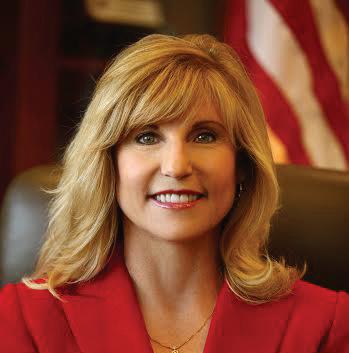
“Something I promised when I ran in 2020 was that I was going to work across the aisle, and that’s something I was able to do and will continue to do, because we have to have balance here,” Davies said. “I think the best legislation that’s passed is when it’s passed by both parties.”
“I really enjoyed the opportunity to serve and make things better,” Davies contin ued. “I love this state; I moved to this state when I was 18, and I don’t plan on going anywhere else. So, I will continue to fight so that we can afford to live here, so we can live here and feel safe.”
CHRIS DUNCAN
Prior to serving on the San Clemente City Council, Chris Duncan served as an assistant U.S. Attorney to the Department of Homeland Securi ty—a career he pursued after the Sept. 11 terrorist attacks.
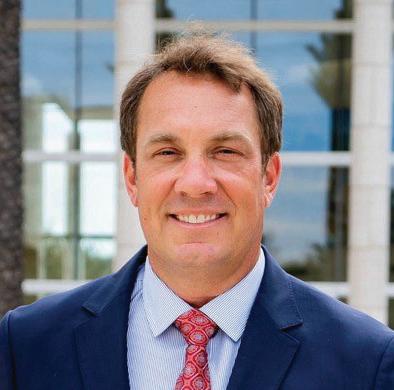
While working with law enforcement officers and national security professionals at the U.S. Cus toms and Border Protection, “advising the decision-makers” as a Homeland Security attorney, Duncan decided that he wanted to be the decision maker.
During his tenure with Homeland Security, Duncan came to realize that “to make a real difference in my community, it’s elected officials who really have that ability to improve people’s lives. Not 10 years from now—tomorrow.”
“I want to be in the room where the decisions are made,” Duncan continued. “I think I have something to offer, foundationally there; I am the type of person who’s willing to stand up for things that are right, even if it comes at personal cost to me, even if it’s politically unpopular, I’m still willing to do that if it’s the right thing for our community, for our district.”
Duncan, who lost his Primary Election campaign for the Assembly seat in 2020, said his top priorities, if elected, are addressing housing affordability and homeless ness.
Duncan said he would like to see a program developed in which unhoused individuals are “connected with the services in a safe environment to address the underlying reason for homelessness—be that economic, health, mental health, substance abuse—instead of doing a one-size-fits-all and saying, ‘Hey, let’s just build a big shelter and put everybody in there.’ ”
Addressing the shortage of affordable housing, Duncan said that rather than push ing for state mandates on local communities, he would rather see the legislature provide incentives for cities to invest in the development with affordable housing.
Duncan added that he would also like to prioritize supporting residents during a time of high costs and rising inflation.
“I think the economics is really forefront in people’s minds,” Duncan said. “Califor nia is too expensive; I mean, everything costs more here. We’ve got to act at the state level to drive down these costs.”
To address rising gas prices, Duncan argued that the legislature should have suspended the gas tax in addition to implementing a rebate program for California drivers.
Arguing that a gas-tax suspension would have a more immediate effect while the rebate program would have had a more long-term effect, Duncan said that “the situa tion was so severe, I thought we should have done both.”
As the state of California sees a nearly $100 billion surplus, Duncan would like to see the money directed back to taxpayers’ pockets.
“When you look at California’s budget, we’ve got a $100 billion surplus. To me, that means people were overtaxed,” Duncan said. “Let’s get that money back into the community, whether that’s through small businesses, tax breaks or credits, whether it’s through rebates to individuals.”
Pointing to his term on San Clemente’s City Council, Duncan added that he has been deeply involved in his community, “seeing what people care about every day.”
“They do care about individual choice,” Duncan said. “They care about protecting their kids, and they care about having a government that’s working for them to keep money in their pockets.”
danapointtimes.comDana Point Times October 14-20, 2022 Page 16
2022 DANA POINT ELECTION GUIDE STATE ASSEMBLY ASSEMBLYMEMBER
SAN CLEMENTE MAYOR PRO TEM
California State Propositions
Constitutional Right to Repro ductive Freedom. Legislative Constitutional Amendment
On the Ballot: Amends California Constitution to expressly include an individual’s fundamental right to reproductive freedom, which includes the fundamental right to choose to have an abortion and the fundamental right to choose or refuse contraceptives. This amendment does not narrow or limit the existing rights to privacy and equal protection under the California Constitution.
Background: This proposed measure that looks to enshrine in the state’s constitution the right to abortion and contraception follows the U.S. Supreme Court’s decision this June to overturn Roe v. Wade the long-standing SCOTUS ruling that found the U.S. Constitutional protection to privacy included the right to an abortion. Under state law, abortions are legal in California up to fetal viability (roughly 24 weeks). Abor tions can be performed after the age of viability only if the pregnancy poses a health risk to the mother. Cur rently, the California Constitution guarantees the right to privacy. Though the Constitution doesn’t explicitly define what’s included in that protection, the California Supreme Court previously found that such protection includes reproductive rights on abortions and whether to use contraceptives.
What Supporters Say: Those advocating for the constitutional amendment argue that doing so would unquestionably protect a person’s right to an abortion, prevent it from being up to interpretation and make reproductive rights a health care issue rather than a political one.
What Opponents Say: Groups such as the No on Prop 1 Committee argue that a woman’s right to choose an abortion is already protected in the California Con stitution and that the amendment would give politi cians more power of health care policies. The California Catholic Conference further argues that the language in the measure is too broad and unrestrictive, protecting late-term abortions.
PROPOSITION 26
Allows In-Person Roulette, Dice Games, Sports Wagering on Tribal Lands. Initiative Constitutional Amendment and Statute.
On the Ballot: Also allows sports wagering at certain horseracing tracks, private lawsuits to enforce certain
gambling laws. Directs revenues to General Fund, prob lem-gambling programs, enforcement.
Background: Proposition 26 is one of two ballot ini tiatives with a focus on sports wagering. Prop 26 focus es on in-person wagering with the addition of roulette and dice games, all of which would be conducted at Native American Indian casinos. Sports betting would be conducted on a wide range of athletic events, with exceptions for high school sports and California college teams. Financially, this would potentially raise tens of millions of dollars annually from 10% of the profits from sports betting at racetracks. Of that generated revenue, 15% would go to problem gambling preven tion and mental health, 15% would go to enforcement, and 70% would go to the General Fund. Supporters for Prop 26 include 25 American Indian tribes and the San Diego Police Officers Association. Opponents for Prop 26 include several corporate casinos and the Republican Party of California.

What Supporters Say: Proposition 26 offers re sponsible, safe, regulated and experienced locations for Californians to participate in new gambling activities.
What Opponents Say: Proposition 26 does not benefit residents or local communities and expands the tax-free monopoly of tribal casinos on gaming.
PROPOSITION 27
Allows Online and Mobile Sports Wagering Outside Tribal Lands. Initiative Constitutional Amendment and Statute.
On the Ballot: Allows Indian tribes and affiliated businesses to operate online/mobile sports wagering outside tribal lands. Directs revenues to regulatory costs, homelessness programs, nonparticipating tribes.
Background: Proposition 27 is the second ballot ini tiative to focus on sports wagering, with a specific focus of online or mobile betting. Prop 27 says it would autho rize gaming tribes and online sports betting or quali fied gaming companies with agreements with gaming tribes to operate online sports betting outside Indian lands. Betting on youth sports would be prohibited. Of the possible hundreds of millions of dollars generated by fees and taxes, 85% of the revenues would go toward permanent and interim housing for the homeless and mental health support, and 15% would go to the Tribal Economic Development Account. Supporters include Major League Baseball, three American Indian tribes and the mayors of Fresno, Long Beach, Oakland and Sacramento. Opponents include the state Democratic and Republican parties, five American Indian tribes, the state Senate and Assembly minority leaders and lieutenant governor.
What Supporters Say: Proposition 27 is an import ant step toward combating homelessness in California and would provide a regulated and sustainable source of funding for those programs.
What Opponents Say: Proposition 27 will only benefit out-of-state gambling corporations and harm the rights of California tribes, which have provided trusted and responsible gambling limited to in-person locations.
PROPOSITION 28
Provides Additional Funding for Arts and Music Education in Public Schools. Initiative Statute.
On the Ballot: Provides additional funding from state General Fund for arts and music education in all K-12 pub lic schools (including charter schools).
Background: Proposition 28 would establish a min imum amount of funding for K-12 public school arts education programs from what was already established by Proposition 98 in 1988. That original proposition guaranteed either a minimum of 40% of the General Fund on K-14 education, plus or a minimum guarantee based on student attendance and change of cost of living. This year’s Prop 28 would guarantee a minimum of 1% of funding received from Prop 98, which would go specifically toward arts education programs. Proposi tion 28 would increase state costs by $800 million to $1 billion annually. Supporters for Proposition 28 include Los Angeles Clippers owner and former Microsoft CEO Steve Ballmer, Universal Music Group, the Superinten dent of the Los Angeles Unified School District, the United States Secretary of Education and the California Teachers Association.
What Supporters Say: Proposition 28 would open up opportunities for low-income and diverse commu nities to benefit children with access and equity in art and music education.
What Opponents Say: No official opposition has been presented against Proposition 28.
danapointtimes.comDana Point Times October 14-20, 2022 Page 17 2022 DANA POINT ELECTION GUIDE
PROPOSITION 1
29
Requires On-Site Licensed Medical Professional at Kidney Dialysis Clinics and Establishes Other State Requirements. Initiative Statute
On the Ballot: Requires physician, nurse practitioner, or physician assistant on-site during treatment. Requires clinics to disclose physicians’ ownership interests; report infection data.
Background: If passed by voters, Prop 29 would impose a series of new staffing and reporting require ments on dialysis clinics, which perform treatment for patients who have developed kidney failure. Clinics would be required to have a physician, nurse practi tioner or a physician assistant on-site during treatment hours; periodically report dialysis-related infection information to the California Department of Public Health; disclose to patients and CDPH a list of all physicians who have an ownership stake of a least 5%; get CDPH’s approval prior to closing or substantially reducing patient services. Prop 29 marks the third at tempt in as many elections to change dialysis centers in California. Like Prop 29, Proposition 23 in 2020 intended to require clinics to have at least one licensed physician during patient treatments and to report data on dialy sis-related infections. That proposal failed, with 63.42% of voters opposed. Proposition 8 in 2018, which failed with 59% of voters against it, would have required clin ics to pay refunds to patients if their profits exceeded 115% of the costs of direct patient care and health care improvements.

What Supporters Say: Service Employees Inter national Union-United Healthcare Workers West, the labor union pushing Prop 29—as well as Props 23 and 8 before that—claims the additional staff would help improve quality of care. Through the prop, the union intends to reform the industry and promote more transparency
What Opponents Say: Those against the latest proposition, including Stop Yet Another Dangerous Dialysis Proposition, which raised millions of dollars in contributions from dialysis companies, argue that it’s a solution in search of a problem; there’s no clear evi dence services are inadequate; the unions are using the measure to pressure clinics and organize workers.
PROPOSITION 30
Provides Funding for Programs to Reduce Air Pollution and Prevent Wildfires by Increasing Tax on Personal Income over

$2 Million. Initiative Statute.
On the Ballot: Allocates tax revenues to zero-emission vehicle purchase incentives, vehicle charging stations and wildfire prevention.
Background: Proposition 30 would increase income tax on incomes over $2 million by 1.75%, and the increase would continue until 2043 or if there are three consecutive years after 2030 with statewide emissions reduced by 80% of 1990 levels. Income tax for those individuals over $2 million is currently 13.3%. The tax revenue would be put into a clean air trust fund with the money divided up into sub-funds. From the trust, 35% would go to an investment plan for zero-emission vehicle infrastructure, 45% would go to the Zero-Emis sion Vehicle and Clean Mobility Sub-Fund, and the other 20% would go to the Wildfire Green House Gas Emissions Reduction Sub-Funds. The sub-funds would also fund the hiring and training of firefighters. Sup porters include ride-share corporation Lyft and the Cali fornia Democratic Party. Opponents include Gov. Gavin Newsom and the Republican Party of California.
What Supporters Say: Proposition 30 will put more zero-emission vehicles on the road earlier than ex pected, which will help the fight against pollution and climate change, and put that responsibility on those able to afford it.
What Opponents Say: Proposition 30 will raise tax es in a state that already has some of the highest taxes in the country and benefits special interests, specifically those of supporting corporation Lyft, where the state has already committed $10 billion to electric vehicles and infrastructure.
PROPOSITION 31
Referendum on 2020 Law that Would Prohibit the Retail Sale of Certain Flavored Tobacco Products
On the Ballot: A “Yes” vote approves, and a “No” vote rejects, a 2020 law prohibiting retail sale of certain flavored tobacco products.
Background: In 2020, Gov. Gavin Newsom enacted Senate Bill 793, a bipartisan measure banning the sale of most flavored tobacco products, which has been popular for teens. Following SB 793’s signing, opponents petitioned to let California’s voters decide whether the ban should go into effect or overturn the policy. Under Prop 31, flavored tobacco products would be defined as that which has a flavor, apart from regular tobacco flavor, such as fruit, mint or vanilla, among other things. Stores or owners of vending machines that sell flavored tobacco could face a $250 penalty for each violation.
What Supporters Say: Supporters of the policy— including the American Lung Association, American Heart Association, and labor unions such as the Cali fornia Teachers Association—claim that the tobacco industry has long targeted teens to purchase its prod ucts and believe the ban would help prevent underage tobacco use.
What Opponents Say: Tobacco advocacy groups, along with the California Republican Party, oppose the proposition on the basis that the policy would ban the sale of flavored tobacco to all California customers, including those legally old enough to purchase such products. Acknowledging that children shouldn’t be allowed to purchase tobacco—which is already ille gal—the opponents believe restrictions can be achieved without prohibiting products to adults.
danapointtimes.comDana Point Times October 14-20, 2022 Page 18 2022 DANA POINT ELECTION GUIDE PROPOSITION
















